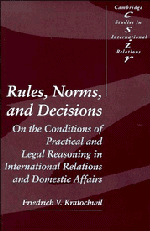 Rules, Norms, and Decisions
Rules, Norms, and Decisions Book contents
- Frontmatter
- Contents
- Acknowledgements
- Introduction: The resort to norms
- 1 Rules, norms, and actions: laying the conceptual foundations
- 2 Anarchy and the state of nature: the issue of regimes in international relations
- 3 The emergence and types of norms
- 4 The force of prescriptions: Hume, Hobbes, Durkheim, and Freud on compliance with norms
- 5 The discourse on grievances: Pufendorf and the “laws of nature” as constitutive principles for the discursive settlement of disputes
- 6 The notion of “right”
- 7 The question of “law”
- 8 The path of legal arguments
- Conclusion: The international legal order, international systems, and the comparative analysis of the practice of states
- Notes
- Index
1 - Rules, norms, and actions: laying the conceptual foundations
Published online by Cambridge University Press: 01 June 2011
- Frontmatter
- Contents
- Acknowledgements
- Introduction: The resort to norms
- 1 Rules, norms, and actions: laying the conceptual foundations
- 2 Anarchy and the state of nature: the issue of regimes in international relations
- 3 The emergence and types of norms
- 4 The force of prescriptions: Hume, Hobbes, Durkheim, and Freud on compliance with norms
- 5 The discourse on grievances: Pufendorf and the “laws of nature” as constitutive principles for the discursive settlement of disputes
- 6 The notion of “right”
- 7 The question of “law”
- 8 The path of legal arguments
- Conclusion: The international legal order, international systems, and the comparative analysis of the practice of states
- Notes
- Index
Summary
ACTION AND MEANING
How do we understand human action, and what role do norms play in this process? The answers to these questions obviously depend upon our concept of knowledge, and this concept, in turn, is constituted by our ideas about the world we live in and which we experience as reality. One way of approaching this problem is, therefore, to reconstruct images of possible worlds and show their epistemological presuppositions. Such a procedure might enable us to see in turn the limitations of certain concepts of knowledge, based on certain world-images.
In this section I want to follow this procedure and investigate three world-images and their corresponding concepts of knowledge. These worlds are: one, the world of observational facts; two, the world of mental facts; and three, the world of institutional facts. While these world-images are not incommensurable, they do establish different “referents” and emphasize different concepts of knowledge. Consequently, they not only give rise to different epistemological puzzles, but they are also only partially translatable into each other. On the other hand, precisely because certain aspects are translatable, concrete phenomena can often be explained by, or be understood from, the presuppositions of a different concept of knowledge.
The world of observational facts
On the most naive level the world of brute facts consists of “givens” that any theory has to analyze. Scientific progress depends upon an exhaustive description of these facts and upon the establishment of certain regularities among them: so goes at least the inductivist fervor à la Bentham or the positivism of Comte.
- Type
- Chapter
- Information
- Rules, Norms, and DecisionsOn the Conditions of Practical and Legal Reasoning in International Relations and Domestic Affairs, pp. 21 - 44Publisher: Cambridge University PressPrint publication year: 1989


